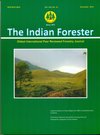Implementation of Forest Rights Act 2006 in Protected Areas of Odisha
DOI:
https://doi.org/10.36808/if/2016/v142i12/77631Keywords:
Conservation, Forest Rights, Livelihoods, Protected Areas, Tribals.Abstract
In protected areas, natural resources support the livelihood needs of local communities, but human activity affects wildlife survival and biodiversity conservation, and leads to serious human animal conflict, such as crop raiding, livestock predation, and loss of human life. Therefore, the future of wildlife is always in conflict with the livelihood of communities. The Forest Rights Act (FRA), 2006 recognises the basic livelihood rights of forest dwellers, but its implementation is besieged with several problems at various institutional levels. With special reference to the implementation of the Forest Rights Act, 2006 in protected areas of Odisha, this paper discusses the conflict between concepts of conservation and livelihood of people, and suggests some ways to strengthen livelihoods.References
Bijoy C.R. (2011): “The Great Indian Tiger Showâ€, Economic and Political Weekly, January 22, 46 (4):36-41.
Badrama Abhayaranya Vikash Parishad (2014): Official Record of Badrama Abhayaranya Vikash Parishad, Sambalpur, Odisha.
Dash Tushar (2009). “Forest Rights Act: A blueprint for future conservationâ€, Infochange, News and Features, April Issue.
Government of India (1996). Panchayat Extension to Scheduled Areas (PESA) Act, 1996, Ministry of Panchayati Raj, New Delhi.
Government of India (2008). The Gazette of India (Extraordinary). Part II, Section-3, Sub-Section (1), January 1, Ministry of Tribal Affairs, New Delhi.
Government of India (2010). “Manthanâ€, Report by National Committee on Forest Rights Act (A Joint Committee of Ministry of Environment and Forests and Ministry of Tribal Affairs), December.
Government of India (2011). “Press Note on Poverty Estimatesâ€, Planning Commission, New Delhi.
Government of Odisha (1959). “Report of the Forest Enquiry Committee of Orissaâ€, Bhubaneswar.
Government of Odisha (2013). “Wild Odisha†Office of the Principal Chief Conservator of Forest, Bhubaneswar.
Kalpavrikh (2011). “Protected Area Updateâ€, Volume- 17, Number- 4, August (No-92), Pune.
Naidu Sirisha C. (2013). “Legal exclusion, Private wealth and Livelihoods: An analysis of work time allocation in Protected areasâ€, Ecological Economics, 89 (2013), 82-91.
Sarangi T.K. (2015). “FRA 2006 in Protected Area of Odisha, India: Contextualizing the Conflict between Conservation and Livelihoodâ€, IEGWorking Paper No- 356, Institute of Economic Growth, Delhi.
Sarangi T.K. (2014). “Working of Forest Rights Act 2006 and Its Impact on Livelihoods: A Comparative Study on Odisha and Jharkhandâ€, CESS Monograph-36, RULNR Monograph-21, December 2014, Research Unit for Livelihoods and Natural Resources, Centre for Economic and Social Studies, Hyderabad.
Sarangi T.K. (2013). “Legalising Rights through Implementation of Forest Rights Act 2006: A Critical Review on Odisha and Jharkhandâ€, Working Paper No-126, RULNR Working Paper No-20, May, Centre for Economic and Social Studies (CESS), Hyderabad.
Sarap K. and Sarangi T.K. (2009). “Malfunctioning of Forest Institutions in Orissaâ€, Economic and Political Weekly, September 12- 18, 44(37): 1822.
Sarap K. Sarangi T.K. and Naik J. (2013): “Implementation of Forest Rights Act 2006 in Odisha: Process, Constraints and Outcomeâ€, Economic and Political Weekly, September 7, Vol. XLVIII, No. 36, pp-61-67.
Sarin Madhu (2010): “Democratizing India's Forests through Tenure and Governance Reformsâ€, Social Action, Volume-60, April-June, pp-104120.
Saxena N.C. (2003): “Livelihood Diversification and Non-Timber Forest Products in Orissa: Wider Lessons on the Scope for Policy Change?â€, Working Paper No. 223, Overseas Development Institute, London, UK.
Springate-Baginski Oliver., Sarin M., Ghosh S., Dasgupta P., Bose I., Banerjee A., Sarap K., Misra P., Behera S., Reddy M.G. and Rao P.T. (2009): “Redressing 'Historical Injustice' through the Indian Forest Rights Act 2006 – A Historical Institutional Analysis of Contemporary Forest Rights Reformâ€, Discussion Paper Series, IPPG, School of Environment and Development, University of Manchester, Manchester.
World Bank (2006): “Unlocking forest opportunities for forest-dependent people in Indiaâ€, Agriculture and Rural Development Sector Unit. Report No. 34481, World Bank, Washington D.C.
Downloads
Downloads
Published
How to Cite
Issue
Section
License
Unless otherwise stated, copyright or similar rights in all materials presented on the site, including graphical images, are owned by Indian Forester.





